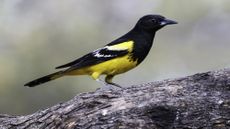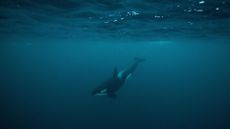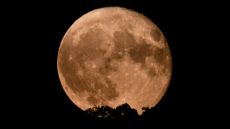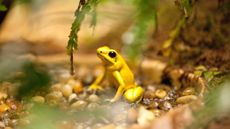Scotland bids farewell to giant pandas
Animals soon to begin journey back to China as loan agreement comes to an end
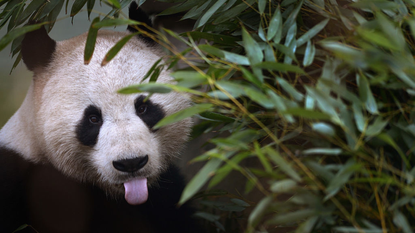
Visitors to Edinburgh Zoo are saying goodbye to two giant pandas today, as zookeepers begin to prepare the animals for their return to China.
Tian Tian and Yang Guang's arrival in Scotland in 2011 "was a huge moment that made headlines all over the world", said The National. "Flag-waving crowds lined the streets as police escorted lorries" transporting the animals through the city, said The Times.
"Scots came out in their droves to see the pair," with the zoo's ticket sales almost doubling in the following 12 months as a result, said The National. But the 10-year loan agreement – which was extended during the pandemic – has now come to an end.
Subscribe to The Week
Escape your echo chamber. Get the facts behind the news, plus analysis from multiple perspectives.

Sign up for The Week's Free Newsletters
From our morning news briefing to a weekly Good News Newsletter, get the best of The Week delivered directly to your inbox.
From our morning news briefing to a weekly Good News Newsletter, get the best of The Week delivered directly to your inbox.
"In an era of less fraught international relations," China first began loaning pandas to countries in 1941 as a "diplomatic gesture", said The Times. Now, "against a backdrop of souring relations between China and the West", there are concerns that the animals "will soon disappear from zoos in the West".
The zoo has run a "Giant Goodbye" programme for the last year, inviting visitors to attend talks and "panda breakfasts" ahead of the pair's departure, said The National.
The exact details of the pandas' travel arrangements are not being disclosed, "for security and safety reasons", said the BBC. They will be travelling with zookeeper Michael Livingstone, who has looked after Tian Tian and Yang Guang "since day one".
"I think it'll be a sad day. I am very happy to be going with them and feel lucky so it's quite nice I get to end that with them," he told the broadcaster.
"Despite many attempts", including the use of artificial insemination, the pair did not manage to reproduce. But Livingstone told The Times there is "still hope" that Tian Tian could conceive once she returns to China. "She is not too old and maybe it will help just being in a different setting."

Continue reading for free
We hope you're enjoying The Week's refreshingly open-minded journalism.
Subscribed to The Week? Register your account with the same email as your subscription.
Sign up to our 10 Things You Need to Know Today newsletter
A free daily digest of the biggest news stories of the day - and the best features from our website
Julia O'Driscoll is the engagement editor. She covers UK and world news, as well as writing lifestyle and travel features. She regularly appears on “The Week Unwrapped” podcast, and hosted The Week's short-form documentary podcast, “The Overview”. Julia was previously the content and social media editor at sustainability consultancy Eco-Age, where she interviewed prominent voices in sustainable fashion and climate movements. She has a master's in liberal arts from Bristol University, and spent a year studying at Charles University in Prague.
-
 Today's political cartoons - December 3, 2023
Today's political cartoons - December 3, 2023Cartoons Sunday's cartoons - life expectancy goes up, Kissinger goes down, and more
By The Week US Published
-
 10 things you need to know today: December 3, 2023
10 things you need to know today: December 3, 2023Daily Briefing Gaza residents flee as Israel continues bombardment, Trump tells supporters to 'guard the vote' in Democratic cities, and more
By Justin Klawans, The Week US Published
-
 5 X-plosive cartoons about Elon Musk
5 X-plosive cartoons about Elon MuskCartoons Artists take on his proposed clean-up of X, his views on advertisers, and more
By The Week US Published
-
 Birds won't be named after humans anymore in an effort to eliminate racist links
Birds won't be named after humans anymore in an effort to eliminate racist linksSpeed Read A number of North American bird species are currently named after historically racist figures
By Justin Klawans, The Week US Published
-
 Cigarette-style warning labels on meat could cut consumption, say scientists
Cigarette-style warning labels on meat could cut consumption, say scientistsSpeed Read The UK's national food strategy aims to cut meat consumption by 30% by 2032
By Sorcha Bradley, The Week UK Published
-
 Young teen wins top science prize for soap that can treat skin cancer
Young teen wins top science prize for soap that can treat skin cancerSpeed Read Memory of Ethiopian workers out in the sun inspired US schoolboy to make cell-reviving soap
By Keumars Afifi-Sabet, The Week UK Published
-
 Why scientists think orcas may be getting smarter
Why scientists think orcas may be getting smarterUnder the Radar Changing ocean conditions may be forcing killer whales to learn new survival skills
By The Week Staff Published
-
 The moon is older than we thought
The moon is older than we thoughtSpeed Read New data adds 40 million years to the satellite's age
By Devika Rao, The Week US Published
-
 New study suggests hitting the snooze button may be no bad thing
New study suggests hitting the snooze button may be no bad thingSpeed Read People who delay getting up perform better in some cognitive tests, research finds
By Arion McNicoll, The Week UK Published
-
 Yes, satellites could fall from the sky
Yes, satellites could fall from the skySpeed Read Debris from thousands of satellites could cause injuries
By Devika Rao, The Week US Published
-
 Why frogs and other amphibious 'climate captives' are 'the world's most threatened animals'
Why frogs and other amphibious 'climate captives' are 'the world's most threatened animals'Speed Read Endangered mammals and birds get a lot of attention, but amphibians are faring much worse in this hotter world
By Peter Weber Published



